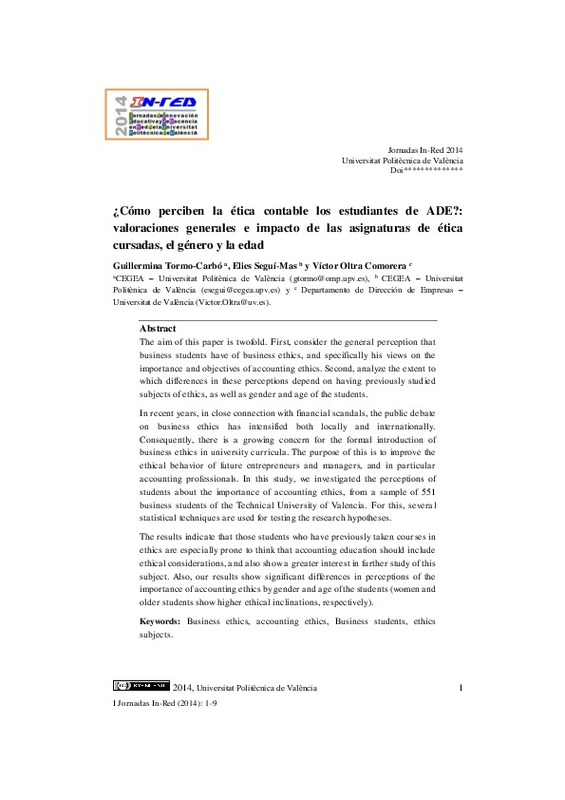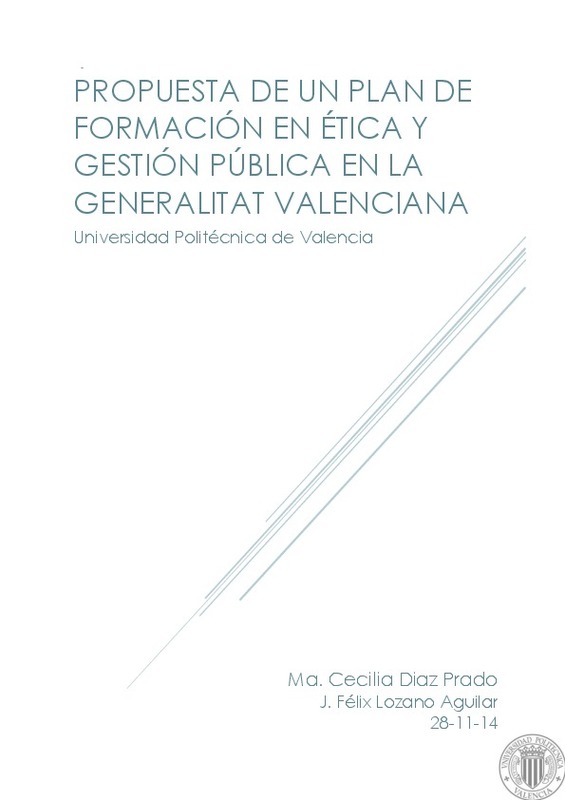|
Resumen:
|
[ES] El objetivo de este trabajo es doble. En primer lugar, examinar la percepción
general que los estudiantes de ADE tienen de la ética empresarial y,
específicamente, sus puntos de vista sobre la importancia y objetivos ...[+]
[ES] El objetivo de este trabajo es doble. En primer lugar, examinar la percepción
general que los estudiantes de ADE tienen de la ética empresarial y,
específicamente, sus puntos de vista sobre la importancia y objetivos de la
ética contable. En segundo lugar, analizar en qué medida las posibles
diferencias en dichas percepciones dependen de haber cursado previamente
asignaturas de ética, así como del género y la edad de los estudiantes.
En los últimos años, en estrecha conexión con escándalos financieros, el
debate público sobre la ética empresarial se ha intensificado tanto a nivel
local como internacional. En consecuencia, existe una creciente preocupación
por la introducción formal de la ética empresarial en los planes de estudios
universitarios. El propósito de ello es mejorar el comportamiento ético de los
futuros empresarios y directivos, y en particular de los profesionales de la
contabilidad. En este estudio, se investigan las percepciones del alumnado
acerca de la importancia de la ética contable, a partir de una muestra de 551
estudiantes de ADE de la Universitat Politècnica de València. Para ello, se
utilizan diversas técnicas estadísticas para realizar análisis descriptivos y se
contrastan varias hipótesis.
Los resultados del estudio empírico indican que aquéllos estudiantes que han
cursado previamente asignaturas de ética son especialmente proclives a
pensar que la educación contable debería incluir consideraciones éticas, y
además muestran un mayor interés en profundizar en el estudio de esta
materia. Así mismo, nuestros resultados arrojan diferencias significativas en
las percepciones de la importancia de la ética contable en función del género
y de la edad de los estudiantes. En la línea de anteriores investigaciones, las
mujeres y los estudiantes de mayor edad muestran mayores inclinaciones
éticas que, respectivamente, los hombres y los estudiantes más jóvenes.
[-]
[Otros] The aim of this paper is twofold. First, consider the general perception that
business students have of business ethics, and specifically his views on the
importance and objectives of accounting ethics. Second, ...[+]
[Otros] The aim of this paper is twofold. First, consider the general perception that
business students have of business ethics, and specifically his views on the
importance and objectives of accounting ethics. Second, analyze the extent to
which differences in these perceptions depend on having previously studied
subjects of ethics, as well as gender and age of the students.
In recent years, in close connection with financial scandals, the public debate
on business ethics has intensified both locally and internationally.
Consequently, there is a growing concern for the formal introduction of
business ethics in university curricula. The purpose of this is to improve the
ethical behavior of future entrepreneurs and managers, and in particular
accounting professionals. In this study, we investigated the perceptions of
students about the importance of accounting ethics, from a sample of 551
business students of the Technical University of Valencia. For this, several
statistical techniques are used for testing the research hypotheses.
The results indicate that those students who have previously taken courses in
ethics are especially prone to think that accounting education should include
ethical considerations, and also show a greater interest in further study of this
subject. Also, our results show significant differences in perceptions of the
importance of accounting ethics by gender and age of the students (women and
older students show higher ethical inclinations, respectively)
[-]
|









